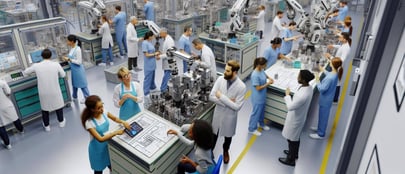Embracing Agile Manufacturing: A Crucial Strategy for Meeting Shifting Market Demands
In the dynamic landscape of medical manufacturing, the ability to swiftly adapt to changing market demands is no longer just an advantage but a necessity. With advancements in technology, globalization, and evolving customer expectations, traditional manufacturing methodologies are being challenged. Purchasing managers in medical manufacturing facilities are facing increasing pressure to ensure their operations remain agile and responsive.
In this blog, we'll explore the adoption of agile manufacturing methodologies and how integration between PlanetTogether and leading ERP, SCM, and MES systems can revolutionize operations, enabling rapid responses to market shifts.

Agile Manufacturing
Agile manufacturing is a philosophy and approach that emphasizes flexibility, adaptability, and responsiveness in production processes. Stemming from the principles of agile software development, agile manufacturing seeks to minimize waste, increase efficiency, and improve customer satisfaction by enabling quick adjustments to production schedules, product designs, and manufacturing processes.
In the context of medical manufacturing, where product innovation and regulatory compliance are essential, adopting agile methodologies becomes even more critical. From changes in regulatory requirements to fluctuations in market demand, medical manufacturers must be prepared to pivot swiftly while maintaining quality and compliance standards.
Challenges in Traditional Manufacturing Approaches
Traditional manufacturing approaches, characterized by rigid production schedules, long lead times, and siloed operations, often struggle to cope with the rapid pace of change in today's market. Purchasing managers are frequently confronted with challenges such as:
- Forecasting inaccuracies leading to overstock or stockouts of critical materials.
- Inefficient use of resources resulting in increased costs and decreased competitiveness.
- Lengthy changeover times delaying the introduction of new products or modifications to existing ones.
- Lack of real-time visibility into supply chain and production processes hindering decision-making.
To address these challenges, medical manufacturing facilities must transition towards agile manufacturing methodologies empowered by advanced technologies and seamless integration between various systems.

The Role of Integration between PlanetTogether and ERP, SCM, and MES Systems
Integration between production planning tools like PlanetTogether and enterprise resource planning (ERP), supply chain management (SCM), and manufacturing execution systems (MES) is pivotal in enabling agile manufacturing. Let's delve into how this integration can facilitate rapid responses to changing market demands:
Real-time Data Synchronization: Integration ensures that data flows seamlessly between different systems, providing real-time visibility into inventory levels, production schedules, and demand forecasts. Purchasing managers can make informed decisions based on accurate, up-to-date information, reducing the risk of stockouts or excess inventory.
Dynamic Production Planning: By integrating PlanetTogether with ERP and MES systems, production planning becomes dynamic and responsive. Purchasing managers can quickly adjust production schedules based on changing demand patterns, regulatory requirements, or supply chain disruptions. This agility allows for faster turnaround times and better utilization of resources.
Streamlined Procurement Processes: Integration with ERP systems streamlines procurement processes by automating purchase requisitions, approvals, and vendor management. Purchasing managers can leverage historical data, demand forecasts, and supplier performance metrics to optimize inventory levels, minimize lead times, and negotiate favorable terms with suppliers.
Enhanced Collaboration and Communication: Integration fosters collaboration and communication across departments by breaking down silos and enabling cross-functional visibility. Purchasing managers can collaborate with production, logistics, and quality assurance teams in real-time, facilitating faster decision-making and problem-solving.
Continuous Improvement: Integration between PlanetTogether and other systems facilitates data-driven insights and analytics, empowering continuous improvement initiatives. Purchasing managers can identify bottlenecks, optimize workflows, and implement best practices to enhance operational efficiency and responsiveness.
In the competitive landscape of medical manufacturing, agility is not just a competitive advantage but a prerequisite for survival. Purchasing managers play a pivotal role in driving this transformation by embracing agile manufacturing methodologies and leveraging technology to enable rapid responses to changing market demands. Integration between PlanetTogether and leading ERP, SCM, and MES systems is key to unlocking agility, enhancing collaboration, and driving continuous improvement across the manufacturing value chain.
By embracing agility, medical manufacturing facilities can stay ahead of the curve, meet evolving customer expectations, and thrive in an increasingly dynamic market environment. Are you ready to take your manufacturing operations to the next level? Contact us today to learn more about how PlanetTogether can help you achieve your goals and drive success in your industry.